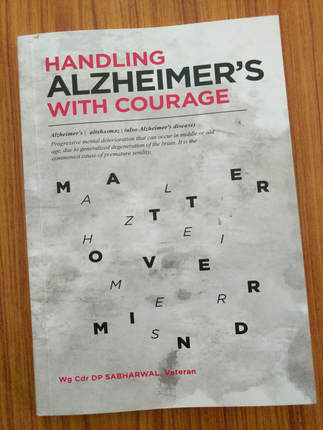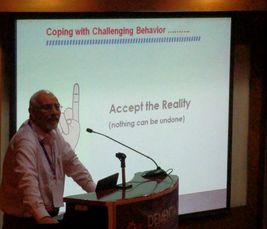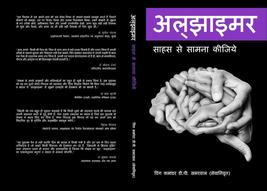Second was the release of a book "Handling Alzheimer's with courage" by Wing Cmdr Sabharwal, a caregiver for his wife. After returning from Bangalore I read the book and found it very well written. There is very little literature available that talks about the dementia journey in the Indian context, and this book fills that need very well indeed. A Hindi version of the book was released in Hyderabad by the Governor of Telangana on the of 21st September. Hopefully there will also be a Gujarati version available soon. Keep watching this space!!
|
This year I attended the International Dementia Symposium at Bangalore on the 14th to 16th of September. I have have been a participant at this yearly event held by ARDSI (Alzheimer's and related Diseases Society of India) for the last few years, but missed last year because of another conference. This year amongst various interesting and innovative things, there were two that were really noteworthy. First the presentation by Swapna Kishore and Sowmya Hegde, which highlighted the caregiver experiences of dementia diagnosis.
Second was the release of a book "Handling Alzheimer's with courage" by Wing Cmdr Sabharwal, a caregiver for his wife. After returning from Bangalore I read the book and found it very well written. There is very little literature available that talks about the dementia journey in the Indian context, and this book fills that need very well indeed. A Hindi version of the book was released in Hyderabad by the Governor of Telangana on the of 21st September. Hopefully there will also be a Gujarati version available soon. Keep watching this space!!
1 Comment
 When a person with dementia needs to be hospitalised, things are very very complex. Hospitals, nursing departments are not geared towards managing the special needs of a person with dementia. Caregivers find that they have to reiterate special instructions to staff, and that there very little adjustment made to the different perceptions of reality that dementia brings. The person with dementia may not be able to remember what they ate for lunch, or what the date is or describe their symptoms, yet medical professionals insist on collecting case history and symptoms from them, and giving them instructions. Caregivers and family members who have gone through this describe these incidents and the problems that they cause. An article from The Guardian describes the care level for people with dementia in hospitals in England as ‘poor’ and discusses these issues. Persons with dementia may go without food, or remain in pain because they cannot communicate their needs. Staff may not understand the patients needs or changes in behaviour which indicated their needs or identify the presence of pain. Information was not shared between services, leading to the needs of the person not being met. Medical and hospital services in India are still treating persons with dementia in the same fashion as they treat other patients. Other countries do have specialised medical and care services for people with dementia and their families. We have a long way to go to make these services dementia friendly. Nightingales Trust completed its walk from Kolar to Bangalore to create awareness about dementia on the occasion of World Alzheimer's Day. Other cities in India also need to create awareness about dementia and support systems for the patients and their families. Read more about the walk here.
|
Donate Now!AuthorDaksha Bhat is interested in the management of ageing. As our society ages we need to create structures that will support the needs of the ageing population. We need to talk about the issues, understand them, and create the social environment that will lead to better services for the elderly. This website is a small attempt to be part of a bigger solution. Archives
March 2021
Categories
All
|




